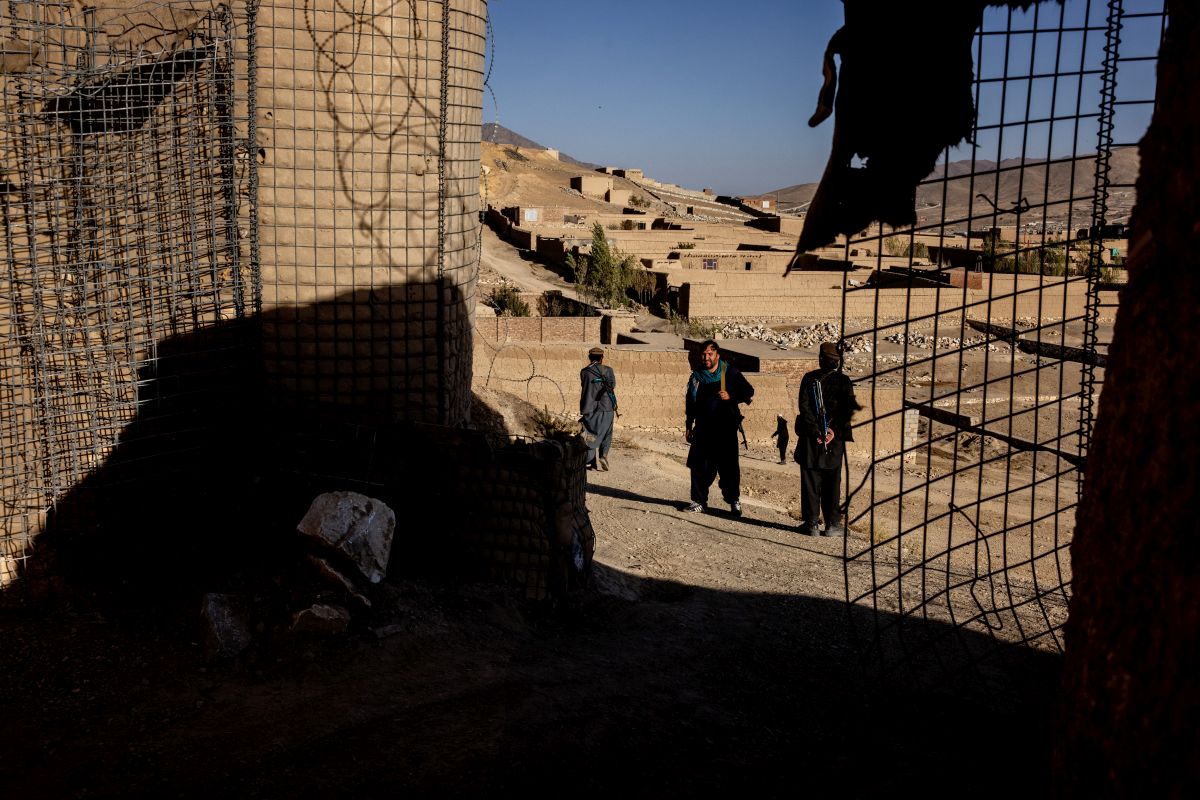Regional Consequences of the Taliban s Takeover of Afghanistan
The Taliban seizure of Kabul will affect the largest countries in the region in various ways. Pakistan is the main winner, while India finds itself in the worst situation. However, the biggest beneficiary could be China, which may gain access to Afghanistan’s minerals and implement its Belt and Road Initiative there. Most countries in the region believe that if the Taliban were to introduce a government approved by the majority of the population and control the entire territory, the new situation may bring more opportunities than threats. However, this requires the Taliban to restrict the activities of terrorist organisations and Afghanistan’s neighbours to recognise the new government.
 Photo: Pascal Maitre/Panos Pictures
Photo: Pascal Maitre/Panos Pictures
Reactions in the Region
The fall of Afghanistan’s government on 15 August has been received differently by the largest countries in the region. Pakistan reacted positively to the change in Kabul, with Prime Minister Imran Khan offering support to the Taliban and describing their victory as a breaking of the “shackles of slavery” of the Afghans. Pakistan has supported the Taliban in many ways over the past quarter of a century and is counting on strengthening its influence in Afghanistan and gaining “strategic depth” there against India. Shi'ite Iran also welcomed the victory by the Taliban, although they are Sunni and among its staunchest enemies in the 1990s, primarily as a defeat of America. Iran has cooperated with the Taliban for several years and hopes that this time they will not persecute the Shi'ite minority and that some Afghan refugees will be able to return to the country from Iran.
The Chinese and Russian governments, which had been in contact with the Taliban for several years, preparing for their eventual takeover of power, reacted with calm to the events in Kabul. After the Taliban takeover of Afghanistan, the countries’ embassies were not evacuated and diplomats intensified meetings with the militants’ representatives. India, which has not established any contact with the Taliban, is in the most difficult situation. After the fall of President Ashraf Ghani's India-friendly government, the Indian authorities took a wait-and-see approach, focusing on evacuating their citizens (including embassy personnel) and allowing fleeing Afghans to apply for special visas. They want to coordinate possible recognition of the Taliban government with other democratic countries.
Impact on Security in the Region
The main challenge for the countries in the region is the possible resurgence of terrorist threats. There are fears of a repeat of the 1990s when Afghanistan allowed training camps for terrorist organisations that conducted operations in Chinese Xinjiang, Indian Kashmir, Central Asia, and Russia. Today, these neighbouring countries are aiming for security guarantees from the Taliban that their territory will not be used for attacks against them, offering in return political recognition and promises of economic cooperation and investment. It seems that the Taliban may indeed be willing to limit the activities of Uyghur organisations in order to curry favour with China, the most important power in the region.
Pakistan’s role will be more problematic. The Taliban have worked for years with their counterparts in Pakistan, particularly the Taliban Movement in Pakistan (TTP), with whom they share ethnic (Pashtun), tribal, family, and militant fraternities. The TTP though are recognised by Pakistan as a terrorist organisation and it has weakened in recent years. Additionally, in taking Kabul, many imprisoned TTP members were released and returned to the Afghanistan-Pakistan border. The Taliban victory in Afghanistan will mobilise their Pakistani counterparts, likely leading to attacks. Despite the Taliban’s close relationship with Pakistan’s ISI military intelligence, it may not be possible for them to break with the TTP, especially at the local level, and Afghanistan may remain an important base for the Pakistani Taliban, reversing the situation of the past 30 years when Pakistan was the base for the Afghan Taliban.
The change in Afghanistan puts India in the most difficult security situation. Many organisations that fought alongside the Taliban, including the Haqqani network and Lashkar-e-Taiba, have attacked Indian targets in both Afghanistan and India in the past. The Pakistani military may again—as in the 1990s—want to turn the focus of their activity on India. Additionally, the 2020 Taliban-U.S. Doha agreement, when the Taliban promised they will “prevent the use of the soil of Afghanistan […] against the security of the United States and its allies”, does not include India, which is not formally a U.S. ally. If relations with the new Afghan authorities fail to normalise, they may allow anti-Indian organisations to continue operating there, leading to an increase in the terrorist threat to India, especially in the troubled region of Kashmir. Additionally, in the regional strategic dimension, India’s position will be hindered by the expected tightening of cooperation between Pakistan and China in Afghanistan.
All countries in the region will benefit from the weakening of the local faction of ISIS, which had been growing in Afghanistan since 2015. The Taliban have directly fought ISIS in recent years and given the former’s current control, they will be able to completely break ISIS’s structures. Other “foreign” Islamic fighters who would like to pursue their own goals from Afghanistan but which could harm the interests of the Taliban may find it harder to operate there. Even if the Taliban continue hosting Al-Qaida, which focuses on combating Western states, it will not be a serious challenge for the countries of the region.
Economic Cooperation
An end to the civil war would open up new prospects for economic cooperation in the region. A number of initiatives in recent years—the Istanbul Process, China’s BRI, the “New Silk Road” promoted by the U.S.—assume the stabilisation and economic development of Afghanistan by taking advantage of its central location in the “heart of Asia”. However, these plans were not implemented due to the fighting and political instability. Afghanistan’s neighbours are counting on the fact that if the Taliban are now able to effectively control the entire territory of the country and ensure security, the country can eventually capitalise on its strategic location. This would mean an increase in state revenues from the sale of raw materials, infrastructure investments, transit fees, and regional trade. This would reduce the government’s dependence on international aid and provide prospects for economic development. The potential increase in legal sources of income offers the Taliban the chance to gradually reduce the cultivation and trafficking of narcotics.
China is likely to play a special role in the reconstruction of the country after the war as it can offer investments through the BRI. The development of infrastructure in Afghanistan would give China better access to Iran and the Middle East, linking the markets of Central Asia with the Persian Gulf. The Chinese also will be interested in the rich deposits of rare-earth minerals, iron ore, copper, oil, and natural gas. The Chinese investments so far, such as the copper mine in Aynak, have been small due to the internal situation and the presence U.S. forces. The withdrawal of foreign troops and the expected difficulties in the Taliban’s relations with the West will give China freedom of action. Pakistan and Iran can count increased trade and better regional connections.
India, which had transferred more than $2 billion in economic aid to Afghanistan in the last 20 years and became the fifth-largest trading partner, with their own interests in the country, will feel the most negative impact. If tense political relations remain, the activities of Indian companies will be impeded and their place will be taken by competitors from China or Pakistan.
Conclusions
The impact of the events in Afghanistan on the countries of the region depends on the internal situation and the policies of the Taliban. If a system of Sharia law is re-imposed, but the government incorporates selected opposition leaders and recognises the fundamental rights of ethnic and religious minorities, Afghanistan under the Taliban may offer more opportunities than threats from the point of view of some countries in the region. An end to the war and the introduction of Taliban control would enable limits on the activities of most terrorist organisations and the development of regional economic cooperation. A much worse scenario assumes the resumption of the civil war and further destabilisation of the country, leading to an influx of refugees to neighbouring countries or farther, and creating a conducive environment for terrorist organisations and drug trafficking.
Therefore, most of the countries in the region—notably except India—will probably quickly recognise the new government in order to protect their security and economic interests. China will increase its involvement by enabling Afghanistan to be included in its regional network of connections. Although the increase in China’s influence will take place at the expense of the U.S., the Chinese investments are also in Western countries’ interest as long as they help stabilise the country and lead to economic development.
Recognition of the Taliban by the countries of the region will hamper EU and U.S. attempts to maintain effective international isolation and pressure on the new government. Economic aid and support for regional initiatives serving the development of regional cooperation and transnational connections will remain the primary instruments of influence of democratic states. Tightening coordination of activities in the region with India, which is the last pro-Western country in this part of the world, is also important.


